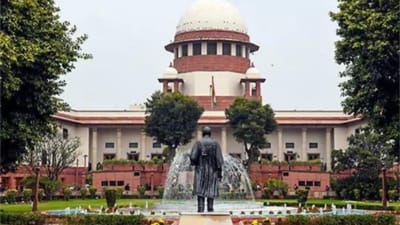New Delhi: The Supreme Court on Friday sought a detailed response from the Gyanvapi Masjid Management Committee regarding a petition filed by Hindu litigants requesting an Archaeological Survey of India (ASI) investigation into the sealed area of the mosque complex. The sealed zone has been a contentious site since the discovery of a structure in 2022, which Hindu petitioners claim is a “Shivling.” The Muslim side, however, maintains that the structure is merely a fountain, reports the Times of India.
The area in question was ordered sealed by the Supreme Court in May 2022 following a court-directed survey near the mosque’s ablution pond, where the fountain was reportedly found.
A bench comprising Justices Surya Kant and Ujjal Bhuyan expressed initial reservations about the Hindu petitioners’ demand to consolidate 17 related lawsuits currently under consideration by two Varanasi trial courts. These suits revolve around the claim that the mosque was built over the demolished Kashi Vishwanath temple. The bench suggested that transferring all cases to a single trial court, preferably presided over by the District Judge handling the main suit, would allow the Allahabad High Court to act as the first appellate forum for reassessment.
The Supreme Court emphasised that key issues, such as the ASI survey of the sealed area and the maintainability of the lawsuits, can be addressed in a focused manner. The Muslim side has argued that the cases violate the Places of Worship (Special Provisions) Act, 1991, which prohibits changes to the religious character of places of worship as they stood on August 15, 1947. A preliminary hearing on these matters has been scheduled for December 17.
The directive follows an earlier decision by the Allahabad High Court permitting the ASI to investigate whether the mosque was constructed over a pre-existing Hindu temple. However, the court had explicitly excluded the sealed area from the survey scope.
Previous ASI surveys, conducted under judicial orders, reportedly uncovered findings that the Hindu petitioners claim support their assertions. Meanwhile, the Anjuman Intezamia Masjid Committee and the Uttar Pradesh Sunni Central Waqf Board have consistently opposed these claims, arguing that they infringe upon the legal protections provided by the Places of Worship Act, 1991.
The Supreme Court’s forthcoming deliberations are expected to have significant implications for the Gyanvapi Masjid dispute, a case that has sparked widespread attention and debate over India’s historical and religious landscape.




